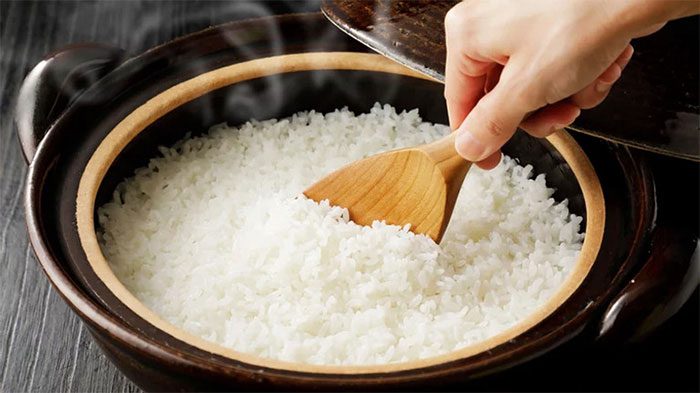Stopping rice consumption for one month can help with weight loss and stabilize blood sugar levels, provided that no other grains are consumed.
Rice is the staple food for 3.5 billion people worldwide and has become an essential part of the daily diet for many people in Asian countries, including Vietnam.
What Happens When You Stop Eating Rice?
Expert Kristen Smith, a spokesperson for the Academy of Nutrition and Dietetics in the United States, states: “Any type of rice is high in carbohydrates – the primary fuel source for the body.”

Rice is a main dish in the meals of many Asian countries. (Photo: Tasting Table).
However, studies show that consuming too much rice is not beneficial for health due to its high starch content and lack of certain nutrients.
According to Indian Express, eating white rice has drawbacks such as causing spikes in blood sugar levels, leading to the risk of weight gain and type 2 diabetes. The World Health Organization (WHO) also notes that white rice can absorb arsenic, a carcinogen. Therefore, when cooking rice, it is advisable to rinse it thoroughly.
Priya Parma, Head of the Nutrition Department at Sri Balaji Action Medical Institute (India), mentions that abstaining from rice for a month can aid in weight loss and stabilize blood sugar levels. Approximately 200 grams of rice contains about 200 calories.
Nutritionist Ria Desai from Wockhardt Hospital (India) explains that completely stopping rice consumption for a month can lead to weight loss, provided it is not replaced with other grains and total carbohydrate intake is limited.
However, it is important to note that blood sugar levels will only decrease during the rice abstinence period. When you start eating rice again, glucose levels will begin to change. Nonetheless, consuming a small bowl of rice at each meal is not harmful to the body.

You need to rinse rice thoroughly before cooking. (Photo: Tasting Table/Vietnamnet).
Muscle Weakness
Experts often recommend a balanced diet that includes a variety of nutrient-rich foods. Eliminating rice from the menu may be temporary to reduce carbohydrate intake.
According to expert Parma, rice contains carbohydrates that are essential for energy production. Not consuming carbohydrates can weaken a person as the body begins to use protein by breaking down muscle for energy, leading to deficiencies in vitamins and minerals. In this case, weight loss occurs due to muscle loss rather than fat burning, which should be avoided.
Therefore, experts advise you to limit white rice consumption and replace it with brown rice. This type of rice is of high quality as it contains many B vitamins, zinc, and magnesium, along with a high fiber content, which helps stabilize blood sugar levels and nourish beneficial bacteria in the digestive tract.
Additionally, you can add fiber to your meals in the form of vegetables and seeds. Cooking rice mixed with certain grains will create proteins that help the body absorb better.


















































